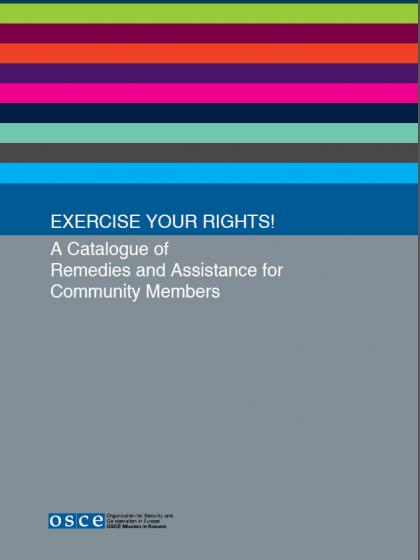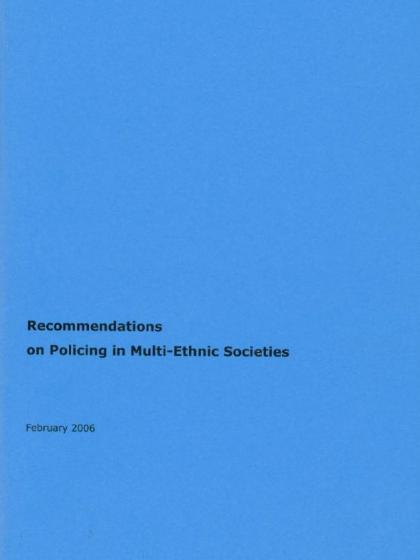Publications
Analysis of the Reporting on Human Rights of Armed Forces Personnel under the 2014 Information Exchange on the Code of Conduct on Politico-Military Aspects of Security
Publishing date: 29 October 2014
Content type: Study / report
Where we are: Forum for Security Co-operation, OSCE Office for Democratic Institutions and Human Rights
What we do: Arms control, Conflict prevention and resolution
Publisher: Organization for Security and Co-operation in Europe
This report is structured in four main parts. The first part outlines the methodology and approach taken for this study. The second part details the analysis and main findings in the obligatory reports of participating States, while part three comments briefly on findings in the voluntary reports on Women, Peace and Security. Part four covers the recommendations on the current reporting, as well as recommendations on the Questionnaire and the Reference Guide should there be a decision to revise these documents in the future.
The Death Penalty in the OSCE Area: Background Paper 2014
Publishing date: 24 September 2014
Content type: Study / report
Where we are: OSCE Office for Democratic Institutions and Human Rights
What we do: Human rights
Publisher: Organization for Security and Co-operation in Europe
The Death Penalty in the OSCE Area: Background Paper 2014 is intended to provide a concise update to highlight changes in the status of the death penalty in OSCE participating States and to promote constructive discussion of this issue. It covers the period from 1 July 2013 to 30 June 2014.
Prosecutorial investigation, regional criminal procedure legislation and experiences in application
Publishing date: 11 June 2014
Content type: Study / report
Where we are: OSCE Mission to Serbia
What we do: Rule of law
Publisher: Organization for Security and Co-operation in Europe
This monograph by a group of authors under the title Prosecutorial Investigation – regional criminal procedure legislation and experiences in application, which is issued by the OSCE Mission to Serbia, addresses one of the most current issues relating to the process of the reform of criminal procedure laws, not only of the countries in the region (Serbia, BiH, Croatia, Macedonia, Slovenia, and Montenegro), but in a much wider context.
A Catalogue of Remedies and Assistance for Community Members
Publishing date: 27 October 2010
Content type: Guide / manual / handbook
Where we are: OSCE Mission in Kosovo
What we do: Human rights
Publisher: Organization for Security and Co-operation in Europe
The catalogue provides communities members in Kosovo with information on what they can do to address concerns relating to the upholding of their fundamental rights, whom to approach and how to make a complaint if they feel their rights have been violated. It covers as many different areas of concern as possible, from how to tackle discrimination based on sex and gender, through the police harassment based on ones community identity, to how to ensure that the name of a village is properly spelt in all languages on a road sign.
OSCE Magazine, 4/2010
Publishing date: 23 November 2010
Collections: OSCE Magazines
Content type: Periodical / journal / magazine
Where we are: Summits / Ministerial Councils, OSCE Main Website
What we do: Arms control, Combating trafficking in human beings, Border management, Countering terrorism
Publisher: Organization for Security and Co-operation in Europe
In this issue: Message from the President of Kazakhstan Nursultan Nazarbayev; OSCE Summits in changing times; Vienna Document; Transnational threats; OSCE engagement with Afghanistan; Anniversaries.
Gender Equality in Elected Office: A Six-Step Action Plan
Publishing date: 9 September 2011
Content type: Study / report
Where we are: OSCE Office for Democratic Institutions and Human Rights
What we do: Democratization, Gender equality
Publisher: Organization for Security and Co-operation in Europe
To provide an assessment of opportunities for enhancing women’s political participation across the OSCE region, this report sets out the general picture of women’s representation in OSCE participating States and reviews the impact of each of the institutional strategies discussed in the Six-Step Action Plan.
OSCE/ODIHR Annual Report 2012
Publishing date: 14 March 2013
Collections: ODIHR Annual Reports
Content type: Annual report
Where we are: OSCE Office for Democratic Institutions and Human Rights
Publisher: Organization for Security and Co-operation in Europe
ODIHR's annual report provides an overview of the Office's primary activities in the areas of elections, human rights, democratization, tolerance and non-discrimination, and Roma and Sinti issues.
Recommendations on Policing in Multi-Ethnic Societies
Publishing date: 9 February 2006
Content type: Book
Where we are: OSCE High Commissioner on National Minorities
Publisher: Organization for Security and Co-operation in Europe
A set of OSCE High Commissioner on National Minorities Recommendations on policing in multi-ethnic societies.
Security Community, 1/2013
Publishing date: 4 March 2013
Collections: Publications
Content type: Periodical / journal / magazine
Where we are: Security Community
Publisher: Organization for Security and Co-operation in Europe
The OSCE's new magazine: Ukraine takes the lead; Helsinki +40; good governance; 20 years High Commissioner on National Minorities.
Integrating Gender into Oversight of the Security Sector by Ombuds Institutions & National Human Rights Institutions
Publishing date: 7 May 2014
Collections: Guidance Notes on Gender in Security Sector Oversight, Guidance notes on Integrating Gender
Content type: Guide / manual / handbook
Where we are: OSCE Office for Democratic Institutions and Human Rights
What we do: Gender equality
Publisher: Organization for Security and Co-operation in Europe
This guidance note on Integrating Gender into Oversight of the Security Sector by Ombuds Institutions & National Human Rights Institutions, developed by OSCE/ODIHR, DCAF and the OSCE Gender Section is a practical resource for ombuds institutions and NHRIs, and those who support them. It can help an ombuds institution or NHRI engage more effectively with police, militaries and other security sector institutions to monitor and reinforce how the human rights of men and women working there are upheld. It can strengthen oversight of how well police and others meet the needs of communities.










